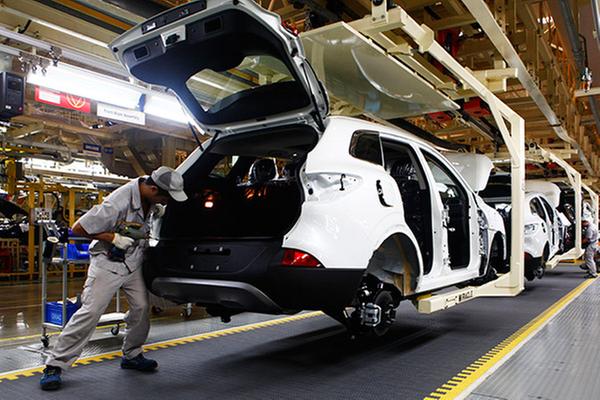Auto makers team up on electric cars

 |
| A worker at the auto production line of Dongfeng Motor Group in Wuhan, capital of Hubei province. [Song Rongcheng/for China Daily] |
New joint venture to have production capacity of 120,000 vehicles annually
The Renault-Nissan Alliance is partnering with Dongfeng Motor Group to develop and sell electric vehicles in China, which analysts said is primarily to prepare for China's imminent introduction of a plan that stimulates sales of such automobiles.Renault SA and Nissan Motor will each hold 25 percent of the new joint venture, eGT New Energy Automotive Co, while Dongfeng will hold the remaining 50 percent, according to a Nissan news release on Tuesday.
The new joint venture will produce electric cars at a Dongfeng facility in Hubei province, which has an annual production capacity of 120,000 vehicles. The first model, a compact SUV, will start production in 2019.
The move came within a week of Ford's signing a memorandum of understanding with Zotye Automobile to produce electric cars. Volkswaguen partnered with JAC Motors on electric cars in May.
Nissan said its move is to tap the potential of the fast-growing segment in China. Statistics from the China Association of Automobile Manufacturers show that 204,000 electric cars were sold from January to July, an increase of 33.6 percent year-on-year.
While agreeing on the prospects for the segment in China, Bill Peng, a partner at PwC's Strategy & China, said that a more urgent mission of the Renault-Nissan Alliance's move is to get prepared for the policy China is set to introduce to boost new energy car sales.
A spokesman for the Ministry of Industry and Information Technology said in late July the policy will be released soon.
As stipulated in a draft-which is widely believed to vary little from the final version-it demands the credits an automaker earns from selling new energy vehicles should account for 8 percent of its total sales in 2018.
One electric car will be calculated as two or more units depending on a number of factors including their mileage on one charge, and one plug-in hybrid as two units.
If carmakers fails to do so, they will either have to buy credits from other automakers, or will simply face a fine, although the amount has not been stipulated by the authorities.
The task will become increasingly challenging, with the percentage growing to 10 percent in 2019 and 12 percent in 2020, according to the draft.
"The logic is clear. As those international carmakers cannot come up with affordable cars, they create joint ventures in China to produce lower-quality and lower-priced ones to earn the required credits," said Yale Zhang, managing director of Shanghai-based consulting firm Automotive Foresight.
In Volkswagen's contract with JAC, it is stipulated that Volkswagen will enjoy priority if it needs to buy credits from the joint venture. Ford and the Renault-Nissan Alliance did not reveal whether they have similar privileges.
Together with Peng and Zhang, John Zeng, managing director of LMC Automotive Shanghai, said more will soon follow suit.




































